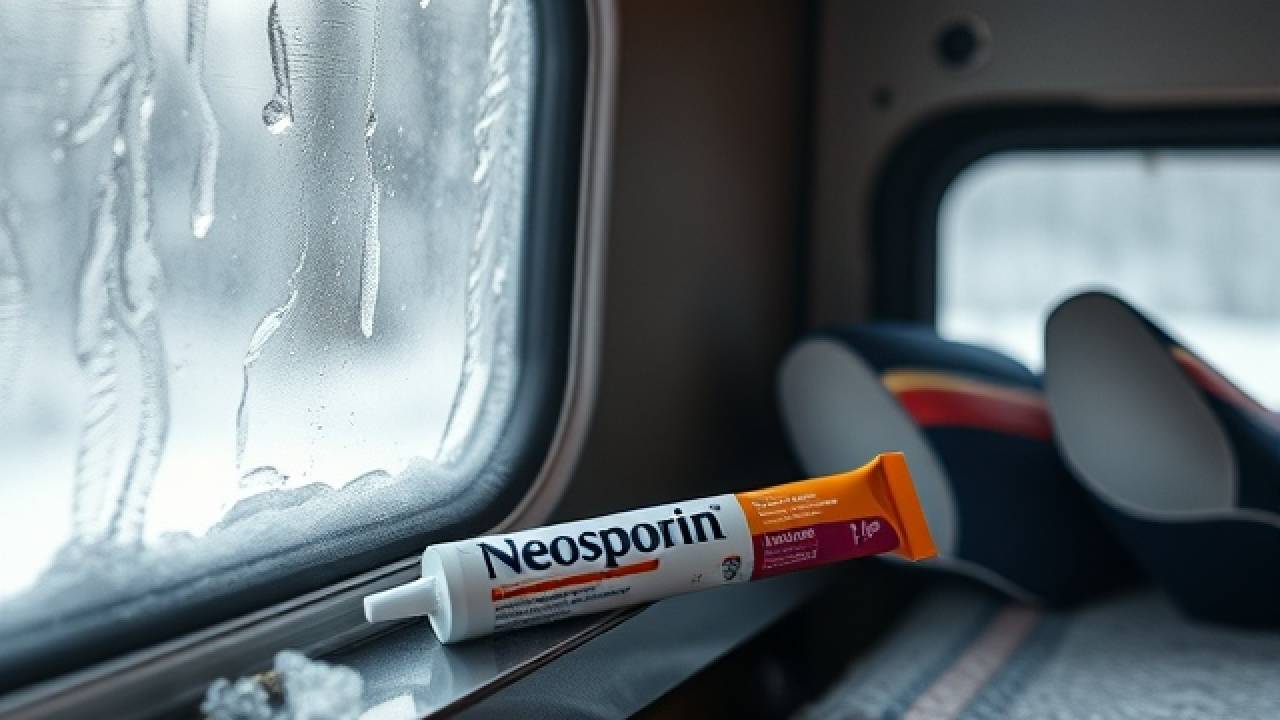With the winter months bringing in cold snaps, the storage of medications in environments like knowing Can Neosporin Be Stored In Camper Over Winter In Pa? prove to be quite challenging. Sub-zero temperatures in Pennsylvania may not only degrade a product’s effectiveness but can also change its physical properties, turning your trusted ointment into something less reliable.
Neosporin, a popular ointment used for treating minor wounds, burns, and infections, has an optimal storage temperature range that’s crucial for maintaining its potency. Pennsylvania winters, famous for their severity, often plunge well below the recommended storage conditions for such medications. This misalignment can lead to decreased efficacy by knowing Can Neosporin Be Stored In Camper Over Winter In Pa when the medication is needed most? posing a risk not worth taking.
Neosporin should not be stored in campers over winter in Pennsylvania due to extreme cold temperatures which can degrade its efficacy. Proper storage involves keeping it at controlled room temperatures away from freezing conditions, thereby ensuring it retains its healing properties effectively.
Can Neosporin be Stored in Camper Over Winter in PA
Storing Neosporin in a camper during Pennsylvania’s winter poses certain risks. Cold temperatures can change the medication’s texture and effectiveness. Typically, Neosporin should be kept in a cool, dry place. However, the chilly winter in Pennsylvania often exceeds what “cool” suggests, potentially freezing and reducing the ointment’s healing properties.
Finding Can Neosporin Be Stored In Camper Over Winter In Pa? consists of antibiotics that help prevent infection in minor cuts and burns. When exposed to freezing temperatures, the chemical composition can degrade. This degradation can make the ointment less effective when it’s needed most. Understanding this helps in planning better storage strategies during cold months.
It is vital to consider the usual storage recommendations by the manufacturer which usually exclude freezing environments. Campers often lack consistent temperature control, making them unsuitable environments for storing medications like Neosporin during cold seasons. This can lead to a loss in medication potency, risking ineffective treatment of infections and wounds.
Safe alternatives include storing the ointment in insulated containers or inside the cabin where heating is available. Keeping Neosporin in a stable, warmer environment ensures it retains its intended consistency and effectiveness. This small precaution helps maintain the ointment’s reliability throughout the winter season.
Risks of Storing Neosporin in Campers During Winter
Storing Neosporin in campers during winter exposes the medication to extreme cold. This extreme cold can cause the ointment to separate or crystallize. Once the consistency is altered, the effectiveness in treating wounds might be compromised. Users might find the ointment too hard to spread, or it may not absorb into the skin as intended.
Another issue with cold conditions is the potential for the container itself to be damaged. Plastic tubes can become brittle when exposed to low temperatures and can crack or split. If the packaging breaches, the ointment could be exposed to outside contaminants, making it unsafe for use.
Moreover, repeated freezing and thawing of Neosporin can degrade its active ingredients. The antibiotics in the ointment are sensitive to temperature fluctuations. If these are subjected to freeze-thaw cycles, their ability to prevent infections diminishes substantially.
It’s also worth considering that emergency access to the ointment in a camper might be hindered in winter. If the camper is not regularly heated, retrieving the Neosporin during an urgent situation could be difficult if it’s frozen or hidden behind other frozen items. This delay could be critical when immediate treatment is needed.
The Role the Winter Climate of Pennsylvania Plays
Pennsylvania’s winter climate is famously harsh and unpredictable. The state experiences cold temperatures that can drop well below freezing. This severe cold is a major factor to consider when storing items like Neosporin in locations such as campers, which may not be insulated against such extremes.
The humidity, or lack thereof, during Pennsylvania winters also plays a critical role. Low humidity levels common in cold environments can further compromise the stability of products like Neosporin. This occurs because low humidity and freezing temperatures together can alter the chemical structure of the ointment, affecting its effectiveness.
Unexpected winter storms and extended cold periods mean that temperatures can remain below freezing for long intervals. This continuous exposure to such cold can have lasting effects on any items not meant to withstand such conditions, including medications that are essential in first aid scenarios.
Proper storage solutions become crucial in these conditions. Without a regulated environment, products stored in campers might freeze and thaw repeatedly throughout the winter. This cyclical change can degrade the product’s quality and effectiveness, impacting its reliability when most needed.
Optimal Storage Conditions for Neosporin
Neosporin, a popular antibacterial ointment, works best when stored properly. It should be kept in a cool, dry place away from direct sunlight. The recommended temperature range for storing Neosporin is between 59°F and 77°F. Storing it within this range ensures the ointment maintains its effectiveness.
Humidity control is also crucial for preserving Neosporin. High humidity can cause the ointment to break down prematurely, affecting its texture and potency. Ideally, the environment should have low humidity to help keep the product in its best condition for when it’s needed.
It’s important to avoid extreme temperature fluctuations, which can happen in places like campers if not monitored. Maintaining a consistent temperature prevents the ointment from melting or freezing, both of which can change its chemical properties.
Proper container storage is another factor to consider. Neosporin should remain in its original packaging — a well-sealed tube that provides protection from air and moisture. This barrier helps prevent contamination and preserves the ointment’s intended consistency.
To help remember these storage conditions, consider keeping Neosporin in a dedicated medicine storage area in your home or camper. This area should be insulated or climate-controlled if possible, to shield the medication from environmental extremes.
Impact of Cold Temperatures on the Efficacy of Neosporin
Exposing Neosporin to cold temperatures can significantly reduce its effectiveness. The active ingredients, designed to prevent infection, can deteriorate if the ointment freezes. This change means it might not work as well when you need to treat cuts or burns.
When Neosporin freezes, its texture also changes. Instead of being smooth and easy to apply, it becomes grainy and hard. This change in texture can make it difficult to spread evenly on a wound, which is crucial for proper healing.
Temperature swings, typical in environments like unheated campers, can further stress the medication. If Neosporin thaws after freezing, it may separate or become watery. These changes could lead to uneven distribution of the active ingredients, making the ointment less effective.
Repetitive freezing and thawing cycles are particularly harmful. Each cycle can break down the ointment’s compounds more and more, which means its ability to fight bacteria diminishes over time.
Alternatives for Storing Medications in Campers Over Winter
Storing medications like Neosporin in a camper during the cold winter months requires careful planning. Instead of leaving them exposed to extreme temperatures, consider using insulated medical bags. These bags help maintain a stable temperature, keeping medications safe from freezing.
Another effective solution is the use of thermal blankets or wraps specifically designed for medications. These wraps add an extra layer of protection, especially useful when temperatures drop drastically and unexpectedly.
Portable heating solutions can also be beneficial. Small, battery-operated heaters or heat packs can be placed near medication storage areas to provide enough warmth to prevent freezing. However, it’s crucial to ensure these heat sources don’t get too hot, as excessive heat can also degrade medications.
For those who store their campers in locations where electricity is accessible, a small electric cooler or fridge designed for medications can be an excellent investment. These units are made to keep a constant and safe temperature, ensuring that medications remain at their required conditions despite outside weather.
Lastly, when possible, consider keeping essential medications like Neosporin in your living quarters if you stay in your camper during the winter. Keeping medications inside with you ensures they stay at room temperature, which is generally safe for most storage needs.
Conclusion
Understanding Can Neosporin Be Stored In Camper Over Winter In Pa during the harsh winter months in Pennsylvania? presents challenges that can compromise its efficacy. Optimal storage conditions are crucial for maintaining its therapeutic properties, requiring temperatures that are consistently within the recommended range and not subject to extreme cold.
Adopting alternative storage strategies, such as insulated containers or climate-controlled environments, can safeguard medications like Neosporin. This ensures they remain effective and ready for use when needed, supporting optimal health and safety outcomes.
FAQ:
Can Neosporin Be Stored In Camper Over Winter In Pa?
Storing Neosporin in campers during winter exposes the medication to extreme cold, which can cause the ointment to separate or crystallize, and also the Plastic tubes can become brittle, crack or split when exposed to low temperatures.
Where to store the Neosporin?
Neosporin should be kept in a cool, dry place, specially in room temperature.
What does the Neosporin medicine provides?
The Neosporin primarily supports optimal health and safety outcomes.







